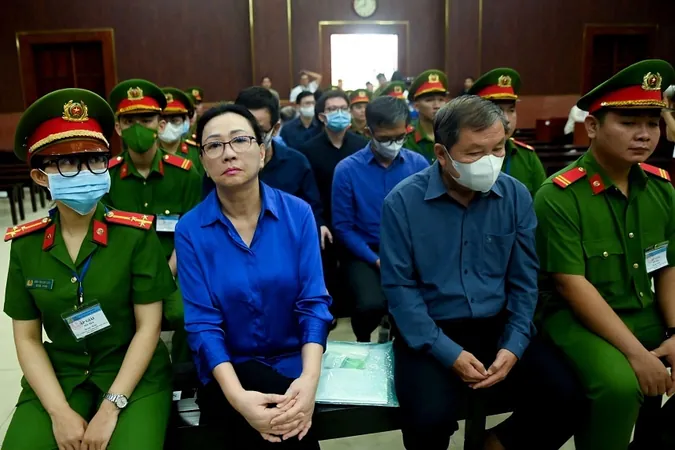
Property Tycoon Faces Death Penalty in Vietnam's Largest Fraud Scandal – Will She Manage to Escape Execution?
2024-12-03
Author: Mei
HANOI – In a shocking turn of events, a Vietnamese court reaffirmed the death penalty on December 3 for Truong My Lan, a 68-year-old property tycoon embroiled in a staggering multibillion-dollar fraud case.
This decision has not only captivated the public’s attention but also thrust the country's legal system and anti-corruption efforts into the limelight.
Earlier this year, Lan, formerly the chairwoman of the Van Thinh Phat Group, was convicted of swindling an astonishing US$27 billion from Saigon Commercial Bank (SCB), a financial institution she was reported to have controlled.
The court emphasized the case's "huge" financial impact and the "extremely serious consequences," ruling that there was no substantial reason to mitigate the death penalty.
However, there is a glimmer of hope for Lan.
Under Vietnamese law, she can have her death sentence reduced if she manages to repay at least 75% of the embezzled assets and cooperates with ongoing investigations. Prosecutors have estimated that she needs to return around US$11 billion to avoid execution.
Discussions regarding multiple investment avenues and loans are underway, though the authenticity of these assets remains uncertain as many are tied up in properties and frozen by authorities.
Interestingly, Lan's life could be spared should she reach the age of 75 before the execution takes place.
This legal nuance adds another layer of complexity to her fate.
The fallout from this scandal has reverberated through Vietnam's financial landscape, resulting in tens of thousands of individuals losing their life savings, which has led to rare public protests from affected SCB investors.
The scale of the fraud, equating to approximately 6% of Vietnam's Gross Domestic Product (GDP) for 2023, has ignited outrage and disbelief among the populace.
During her court appearance, Lan passionately expressed her remorse for the situation, stating the most efficient way to repay the embezzled funds would be to liquidate SCB's assets to clear debts owed to the State Bank of Vietnam and the public.
Despite her claims of embarrassment regarding the charges, her predicament reflects a much larger narrative concerning corruption in the country.
The broader context of this trial reveals Vietnam’s aggressive stance against corruption, particularly in the higher echelons of power.
The Communist Party is determined to root out systemic corruption, as evidenced by a nationwide crackdown termed "the burning furnace," which has captured numerous officials and business elites, including some high-ranking central bank officials.
In a separate legal battle, it is worth noting that Lan was also sentenced to life imprisonment for money laundering last month, complicating her legal challenges even further.
The media frenzy surrounding this case continues, with many analysts arguing that Lan's downfall serves as a cautionary tale and an ominous warning to others within the realm of business in Vietnam.
As the clock ticks down on her potential execution, the eyes of the nation—and the world—remain firmly fixed on Truong My Lan.
Will she successfully navigate her way out of this dire situation, or will her tale become a grim statistic in the annals of corporate crime? The coming weeks will undoubtedly reveal the next chapters in this unfolding saga.


 Brasil (PT)
Brasil (PT)
 Canada (EN)
Canada (EN)
 Chile (ES)
Chile (ES)
 España (ES)
España (ES)
 France (FR)
France (FR)
 Hong Kong (EN)
Hong Kong (EN)
 Italia (IT)
Italia (IT)
 日本 (JA)
日本 (JA)
 Magyarország (HU)
Magyarország (HU)
 Norge (NO)
Norge (NO)
 Polska (PL)
Polska (PL)
 Schweiz (DE)
Schweiz (DE)
 Singapore (EN)
Singapore (EN)
 Sverige (SV)
Sverige (SV)
 Suomi (FI)
Suomi (FI)
 Türkiye (TR)
Türkiye (TR)